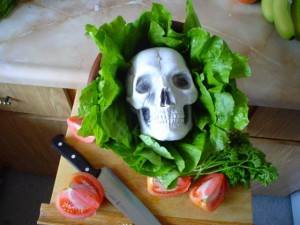“People get ill,” says Ted Labuza, a professor of food science at the University of Minnesota. “If you really want to reduce your chances, washing it good enough is going to maybe reduce the risk.”
 Labuza says people should scrub, rather than rinse, their fruits and vegetables for 30 seconds.
Labuza says people should scrub, rather than rinse, their fruits and vegetables for 30 seconds.
“It should really be to one rhyme of Mary Had a Little Lamb,” he says.
In this video from the University of Minnesota Extension, the difference between a quick rinse and deep wash with your hands is dramatic.
“The friction is scraping it off, but you don’t want to scrape it off so much that you’re damaging the fruits and vegetables,” Labuza says.
He says a good wash will remove about 90% of the bacteria. For most healthy people, that’s enough to avoid getting sick from a variety of food-borne illnesses, like E. coli, salmonella and listeria. Older people and children are generally at greater risk.
Studies have shown that water and friction offers a similar clean to commercial vegetable washes or diluted vinegar.
But, in rare cases, the best cleaning won’t help. For example, leafy fruits and vegetables that have been irrigated with bacteria-infected water can be dangerous.
“We do know with things like lettuce and spinach, sometimes the bacteria crawls up through the channels and nothing is going to work there,” Labuza says.
